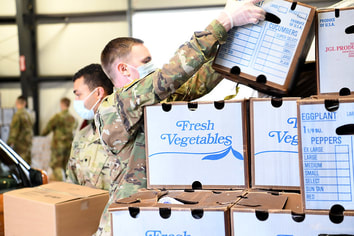
For starters, we can listen to our leaders and follow their directions whether it’s a call for total isolation or social distancing. It’s imperative that we each avoid getting sick and infecting others.
Keep yourself up to date. Your local health department and government will issue alerts and updates on their websites and through text, emails, and other social media avenues. Facts and directives are in constant flux so sign yourself up to ensure you’re getting the latest information.
Each of us is in a different boat and must decide for ourselves how we will ride out the storm. The media is full of suggestions on how to occupy your time and keep yourself both physically and mentally healthy.
Here are my thoughts:
- Join local social media groups, if you use social media, and stay connected to your communities – especially important to avoid isolation. I participate in several Facebook groups, including one for my neighborhood and another for the local food scene. Yesterday, two different neighbors posted their need for toilet paper and paper towels. Neighbors asked for addresses and dropped packages off while others provided online sources for orders. The local food scene promotes restaurants, take out menus, and convenience food stores to encourage purchases to keep our local business establishments humming as well as sources to secure necessary provisions.
- Use your time to approach the daunting tasks you rarely find time for. For me, it’s a voluminous and somewhat intimidating Grandmother’s Journal for my newborn grandchild. Each day I sit in a pleasant spot and journal one to two pages. As the pandemic progresses, the pages are neatly filled. As a bonus, the memories have prompted interesting conversations with my siblings and, by the time this is over, the journal will be completed.
- Give of yourself in whatever way you can. Helping others is empowering. There is so much need in our communities as well as nationally and globally. Blood is in short supply so if you can, please donate blood. Make other donations, no matter the size, to food banks and disaster relief agencies to help those less fortunate. Work through local governmental organizations and faith communities to determine other needs in your community.
- Connect with others. Call, text, email, FaceTime, Zoom are some of the ways to reach out to your family, friends, colleagues and neighbors. One phone call in these dire times can lift the spirits of someone feeling sad and lonely. Check in with your loved ones regularly and look after your neighbors. Frequent and regular contact is so important during a nationwide crisis.
- Identify those you know who are sick, either from the virus or other ailments. Reach out to them so they know they are not alone. If you can help, please do so, whether it is dropping off some soup or a meal or flowers from your garden in a glass jar; it doesn’t need to be fancy to be thoughtful.
Please know that whatever your circumstances or wherever you are, you are not alone. We are in this together and we are going to get through this. It’s going to take your cooperation and patience, but we can do this!
Robbie Miller Kaplan is an author who writes from a unique perspective as a mother who has lost two children. She has written How to Say It When You Don't Know What to Say, a guide to help readers communicate effectively when those they care about experience loss, now at a reduced price for e-books for "Illness & Death," "Suicide," "Miscarriage," "Death of a Child," "Death of a Stillborn or Newborn Baby," "Pet Loss," "Caregiver Responsibilities," "Divorce" and "Job Loss." All titles are in Amazon's Kindle Store. Click here to order.
 RSS Feed
RSS Feed
